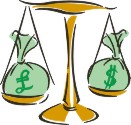Eight Steps to Tackle the Money-Saving Process (Part 5)
by
Gregory Thomas |
|
| Gregory Thomas is the editor of
SavingSecrets.com. SAVING MONEY IS AS EASY AS 1...2...3! WANNA LEARN HOW?
Hop over to our web site and find FREE money-saving articles, a FREE bi-weekly
"Money Saving Tips" newsletter and even a FREE Ebook download titled "Coming Up
With Some Xtra Cash" just for stopping by! Click Here - -
http://www.SavingSecrets.com |
 Part 5: Weighing the Costs, Risks,
and Benefits Part 5: Weighing the Costs, Risks,
and Benefits
In
addition to lowering your monthly bills and expenditures, you need
to look at your shopping/spending habits and determine if any
changes need to be made.
This is extremely important for a
number of reasons. Basically, how helpful would it be if you took
time to research and implement effective money saving tips, then
went out and needlessly spent $200 on stuff you really didn't need?
You would have done all that hard work for nothing.
This is why it is important to not
only lower your monthly expenses, but to also adopt the mind set
that before a single dollar is spent on anything, weigh the cost,
risk and benefits they will have on your budgeting efforts.
Cost - Risks - Benefits
~~~~~~~~~~~~~~~
What does that mean - cost, risks and
benefits?
Basically, this is a shopping
mentality most frugal and conscientious individuals maintain
WHENEVER they are faced with the choice to buy, or not to buy (the
question every shopper should address before spending their hard
earned money).
Think of this as a ritual you follow
prior to purchasing ANYTHING. From the smallest trinket, to the most
expensive gadget, get into the habit of comparing the COST - RISK -
BENEFIT, before you spend a single dollar.
Regardless of how much it costs, get
used to comparing these three important factors. For smaller,
inexpensive purchases, you can simply weigh the pros and cons in
your head. For larger, more expensive purchases, you should write
down the benefits and consequences and discuss it with significant
others in your family.
 COST COST
First of all, the COST of the
item/product you are thinking about purchasing. Is it reasonable?
Will buying this product put a major dent into your spending
allowance? Can you afford to purchase this product without having to
change any spending/living habits?
Get used to questioning the cost of
every purchase. Ask yourself questions such as - would it be better
to wait for a sale or markdown? What about buying the item/product
used or borrowing from friends?
RISK(s)
What is the RISK to you and your
family if you do decide to purchase a particular product? In other
words, how will it affect your lives?
For example, if you were to purchase
a new $30,000 car, what effect would that have on you, your
significant-other, your children, etc? Will you have to work more
hours in order to get by? Will you have to cut back in other
spending areas to afford this new payment? Will this added expense
keep you from paying your other monthly bills with ease?
There are always RISKS to consider
whenever you purchase something, especially when you purchase
something with an expensive price tag. Many times we overlook these
RISKS and simply buy without thinking about all the possible
consequences. Keep this in mind and you'll avoid putting yourself
and your family at RISK!
BENEFIT(s)
In addition to the risks associated
with any new purchase, there are also some benefits to consider. At
least there should be some benefits or you shouldn't even be
thinking about buying it. In short, how will this product benefit
you and your family? Do the benefits outweigh the risks?
To put this into perspective, imagine
a large scale. The Item/Cost is in the middle of the scale, and on
each side are balances. One side has the RISKS, the other side has
the BENEFITS.
If you find that the BENEFITS
outweigh the RISKS, then you know that the purchase is reasonable
and will BENEFIT you and your family. On the other hand, if the
RISKS outweigh the BENEFITS, then you may want to consider not
buying that particular item. Why put you and your family at RISK if
it's not going to benefit them?
Make it a habit to always compare the
RISKS with the BENEFITS before buying. Not only will you find
yourself becoming a more wise, careful shopper, you'll find this to
be an excellent money-saving opportunity to help you in achieving
your goal.
Next Issue - Part 6: Implement A
"Game" Mentality
--End--
| 